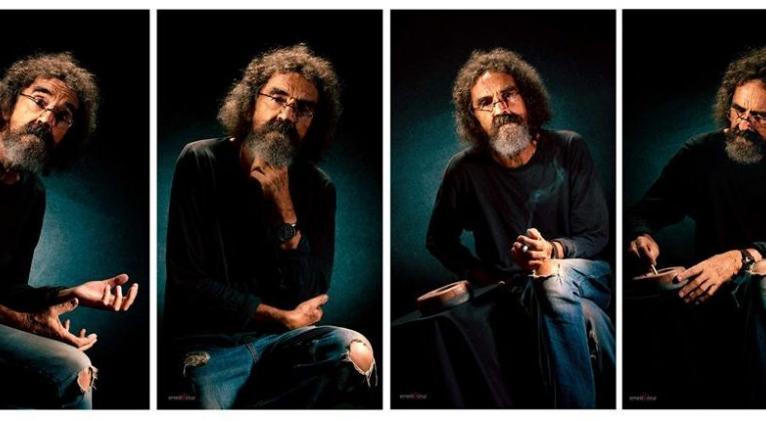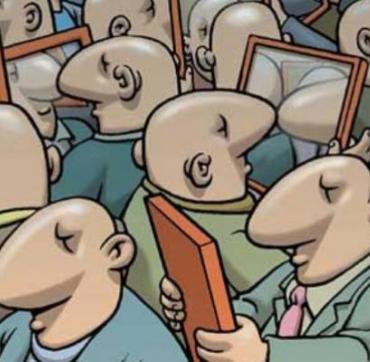Moisés Rodríguez, Living Through Humor
especiales

I've known Moisés Rodríguez my whole life. If he's reading this, I can imagine the expression he'd use when he asked, "Where from?" But if I tell you I'm Eduardo and Rosa's granddaughter, Mayi's daughter, and Juanito's niece, from Finca San Miguel in Corral Nuevo, he'll surely understand: long before I was rolling in laughter at the antics of Roberto el Loco, he was famous in family tales from those years when his father was the pastor of Campamento Bautista and his house was the first place where my mother and uncles, already teenagers, watched television.
“It was a heavenly childhood. It was a large family, eight siblings, all with biblical names. When the service was over, my old lady would clean up and, upon arriving home, say, ‘I'm missing one.’ It was me, who had fallen asleep somewhere. We lived in a little bit of the kingdom of heaven,” she recalls.
The Seña del Humor, chronologically, the second opportunity to admire Moisés's comedic wits, but wrapped in a stage and text approach where laughter was always connected to thought, for which his birthplace must have also been very useful:
“We grew up in an intellectual world. Dad was, undoubtedly, and Mom too, a very dedicated person. I always loved learning and was a good student, up to a certain point. They never forced us to study anything specific; they gave us free reigns. My first four siblings focused on science; I got bored with all that nuts and bolts stuff. I always had a very rebellious temperament.”
That restlessness lasted until university: “I was very crazy. In high school, the teachers were eager to get rid of me; some even allowed me to miss classes just to avoid having me in the classroom. When the time came to choose my majors, I couldn't get into Art History, which was what I wanted, and I chose Political Economy. I didn't even know what it was about, but it was taught right in the center of Havana, across from the Coppelia Ice-cream parlor, and it served as a great way to enjoy myself. My adventures in that first year at the University of Havana were memorable, until I switched to study teaching and Spanish literature in Ciudad Libertad.
In that vocation, he has had steps to follow: "My great-grandfather, Alfredo Ulpiano Cabrera, presided over two revolutionary clubs in Key West and was secretary of the presidential club, of which José Martí was the delegate. He also served as director of an explosives factory that supplied the mambises soldiers.
“He was an intellectual who spent two years studying at San Carlos and San Ambrosio seminary. He then dropped out, became a teacher, and was an supervisor for primary education. When the Spanish created the Creole corps to serve Spain, they called him and tried to convert him to volunteer. He refused, and the next day he left with his entire family for the United States. He was a friend of Carlos Rolof, Tomás Estrada Palma, Calixto García, among others.
“There was an accident at the explosives factory; he was seriously injured and ended up in a hospital. A pastor visited him there, and my great-grandfather converted to Protestantism because he felt it had more biblical authority. In 1899, he came to Matanzas to found the Presbyterian Church. All of this has influenced my development, creating an intellectual and spiritual heritage; that's the story I identify with.”
In addition to being a teacher, Moisés has worked as an art critic and visual artist, but humor came to him early on and stole the spotlight, even beyond his professional life:
“I discovered my humor in school in the countryside. At night, in the shelters, we were bored out of our minds, and I started doing one-man shows. The camp management saw me as a way to entertain, and then they took me to where the other schools were. This was on foot, at night, accompanied by a teacher, and that also gave me a way to make ends meet so I wouldn't have to go to the fields. My job was to create stories, sketches, and costumes.” Since then, my way of relating to others has been through humor.”
Indeed, it has been that facet that has endeared him to the public. While Roberto could be considered his most popular character, it wasn't the one that brought him to the media:
“I started in television in the early 1980s, as part of La Seña. The first thing we did was a parody of the well-known program 9550. It was very popular, and its director, Julio Pulido, continued to count on us; even when Carlos Otero left Sabadazo, our group was called in to do the last 12 broadcasts.
“I worked for almost three years on the radio show Alegrías de Sobremesa. My character was introduced as ‘Constantín Quintero de la Barca, playwright, great actor, and a kind of writer you’ll never seen before.’ The scripts were wonderful by Amed Otero Prado, and also some by Alberto Luberta. It was an exhausting job that, eventually, I had to give up. I was going through a very turbulent period, where I was called upon to entertain a club or to jokingly commentate on a baseball game. I did a bit of everything.”
For health reasons, he's had to slow down his performances as a comedian, but never his creativity:
“I come up with all sorts of funny things and write them down; maybe one day they'll end up in a book. I'm also working on a biography of my great-grandfather. I've always been involved with the visual arts, and to avoid arguing with my wife, I start painting. I've already had several exhibitions, even though I have no formal training. My artist friends give me canvases, acrylics, and stretcher bars. I'm not interested in figuration; I go for the expressionist, abstract, gestural tendency; I always try to make it a playful experience.”
Meanwhile, the 2025 National Humor Award winner is dedicated to enjoying the happiness that, by the way, is within reach:
“My family makes me happy. I have two grandchildren who are ‘my little kings,’ to use a term inspired by Martí, as well as my brothers and nephews. As a born Christian, amid all my madness, I thrive on having a calm, peaceful, unprejudiced spiritual life.”
Translated by Amilkal Labañino / Cubasi Translation Staff














Add new comment